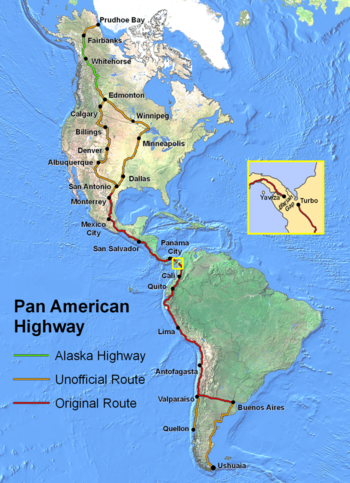
The Pan-American Highway is a series of routes that passes through Mexico, Guatemala, El Salvador, Honduras, Nicaragua, Costa Rica and Panama in North America, and Colombia, Ecuador, Peru, Chile and Argentina in South America. It is listed in the Guinness Book of World Records as the longest motorable road in the world. While it doesn't officially have a route through the U.S. and Canada, some people start in Alaska and drive/bike to Ushuaia, Argentina, the southernmost tip of South America. It is necessary to bypass the Darién Gap between Panama and Colombia by ferry, however.
Understand
The Pan-American Highway is about 15,000 miles (24,000 km) long depending on the route you take. There are many options in the United States, Canada, and Mexico because of the large area and number of roads. Central America has only a few roads going north to south, with most of them - especially the Pan-American highway running along the Western (Pacific) shore.
Prepare
- See also: travel in developing countries
The Pan-American Highway passes through many diverse climates and ecological types, from dense jungles, to arid deserts, some of which are passable only during the dry season, and in many regions driving is occasionally hazardous.
Talk
Most of the route passes through Spanish speaking countries and thus you should definitely make an effort to learn some Spanish. Not only will it be invaluable in case of any problems (and there will be problems on a long trip), but you will be much more able to get to know the locals and experience the culture of places you pass through and stay at.
Get around
There are several modes of travel that are used on the Pan-American Highway.
By bus
It is possible to use buses down all the way to Argentina, except for the Darien Gap.
By car
See Driving in Canada, Driving in the United States, Driving in Mexico If you drive by personal vehicle, it is important to know that your vehicle must be shipped from Central to South America (or vice versa) in order to travel around the Darien Gap. While your vehicle is shipped, you can transport yourself by plane or boat. Driving the Pan-American Highway is certainly possible, and many travelers complete the overland journey from North America to South America (or vice versa) each year.
By bike
While most of the territory the Pan-American highway passes through cannot considered "bike-friendly" by any stretch of the imagination, every year countless people do successfully travel all or part of the route by bike. Knowing how to fix minor defects is essential if you want to attempt the whole route on your own as help is often not forthcoming on rural stretches of the highway. A firm grasp of local languages (particularly Spanish) is another thing to consider.
Route
Because the route of the Pan-American Highway essentially consists of a number of other famous driving routes (such as the Alaska Highway and the Inter-American Highway) in succession, more detailed planning should be done by researching each of those sections. Furthermore there are numerous alternative routes possible. Here we can only give a summary with links to more details about various subsection of the route.
The Arctic
Historically, there was only one road in North America that led to the Arctic coast, the Dalton Highway with its northern terminus at Deadhorse (Alaska) (Prudhoe Bay). On this route, the next section is the Alaska Highway from Fairbanks headed southeast to Watson Lake (and on to Dawson Creek, see below)
However since 2017, there is also an all-weather road to the Arctic Coast in Canada, the Inuvik-Tuktoyaktuk Highway, with its norther terminus at Tuktoyaktuk. If using this new starting point, a connection much be made to the Dempster Highway to near Dawson City, Yukon. And from there on the Klondike Highway and possibly the Campbell Highway through the rest of Yukon Territory.
All routes converge at Watson Lake, Yukon
No Matter which route you take in the Arctic, you cannot connect to the rest of North America without passing by Watson Lake. At this point you need to decide which of the many routes through Canada you would like to take, since the Government of Canada has not declared any highways "official" sections of the Pan-American system. Likely options include:
- BC 37 to BC 16 at Kitwanga, then BC 16 to Prince George
- BC 97 directly to Prince George
- BC 97 to Dawson Creek and on to Alberta
Mexico
In Mexico are more varying routes. You can go via Monterrey and the Isthmus of Tehuantepec.
Guatemala
- Huehuetenango
- Chimaltenango
- Guatemala City
- Cuilapa
- Jutiapa
El Salvador
- Candelaria de la Frontera
- Santa Ana
- San Salvador
- Cojutepeque
- San Miguel
Honduras
Nicaragua
Costa Rica
- Liberia (Costa Rica)
- Alajuela
- San José
- San Isidro
Panama
This is the location of the Panama Canal and the Darien Gap, so there's a gap in the Pan-American highway here.
Colombia
Ecuador
Peru
- Chiclayo
- Trujillo
- Lima
There are also weird Ica, Nazca, and other drawings.
There's also varying routes around here:
- Chile
- Bolivia and Argentina
Variant via Bolivia
Chile
Argentina
- National Route 9
- National Route 7
- National Route 3
Stay safe
Try to avoid areas where cartels operate. Follow the advice for the area you are at.
